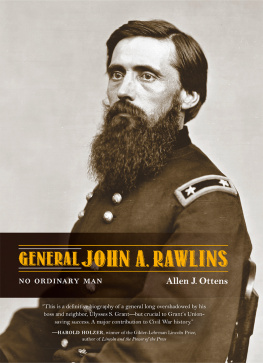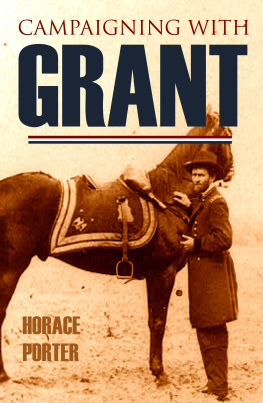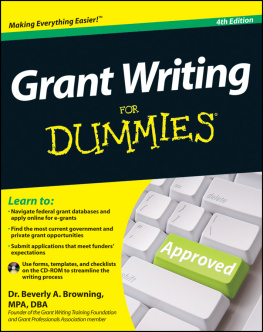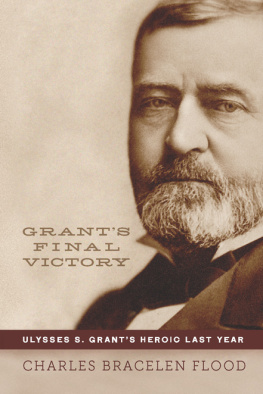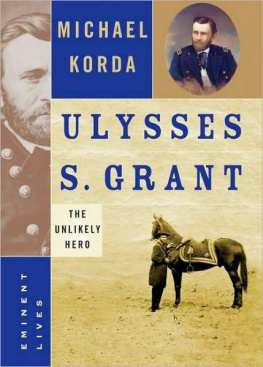Contents
Guide



This book is a publication of
Indiana University Press
Office of Scholarly Publishing
Herman B Wells Library 350
1320 East 10th Street
Bloomington, Indiana 47405 USA
iupress.org
2021 by Indiana University Press
All rights reserved
No part of this book may be reproduced or utilized in any form or by any means, electronic or mechanical, including photocopying and recording, or by any information storage and retrieval system, without permission in writing from the publisher. The paper used in this publication meets the minimum requirements of the American National Standard for Information SciencesPermanence of Paper for Printed Library Materials, ANSI Z39.48-1992.
Manufactured in the United States of America
First printing 2021
Library of Congress Cataloging-in-Publication Data
Names: Ottens, Allen J., author.
Title: General John A. Rawlins : no ordinary man / Allen J. Ottens.
Description: Bloomington, Indiana : Indiana University Press, [2021] | Includes bibliographical references and index.
Identifiers: LCCN 2020057366 (print) | LCCN 2020057367 (ebook) | ISBN 9780253057303 (hardback) | ISBN 9780253057310 (ebook)
Subjects: LCSH: Rawlins, John A. (John Aaron), 1831-1869. | Grant, Ulysses S. (Ulysses Simpson), 1822-1885Friends and associates. | GeneralsUnited StatesBiography. | United States. ArmyBiography. | United StatesHistoryCivil War, 1861-1865. | Cabinet officersUnited StatesBiography. | United StatesPolitics and government1865-1877. | Galena (Ill.)Biography.
Classification: LCC E467.1.R25 O88 2021 (print) | LCC E467.1.R25 (ebook) | DDC 355.0092 [B]dc23
LC record available at https://lccn.loc.gov/2020057366
LC ebook record available at https://lccn.loc.gov/2020057367
CONTENTS
T HE LAST SEVERAL YEARS HAVE seen a renaissance in book-length studies of General and President Ulysses S. Grant. New books have sought to provide insight into the quiet mans personality and character, striving to illuminate aspects of his life that might help explain the traits and motivations that made the victorious general and two-term president the man that he was.
Although many insightful treatments of Grant have been published, it is important to remember that Grant did not live in a vacuum. He was a product of the era in which he lived and was influenced by those around him. Acknowledging that context is vital to understanding the man himself and the momentous times in which he lived.
One of the most influential figures in Grants life was John A. Rawlins. Rawlins was a lifelong resident of Galena, Illinois, who identified politically with the Democratic Party leading up to the Civil War. Yet at the outbreak of the war, he quickly distinguished himself as a strong supporter of the Union. He entered the Federal army and went on to serve his country alongside Grant, playing a key role in the preservation of the nation.
Early on, Rawlins saw in Grant someone who shared his ideas and one to whom he could provide unwavering support. He proved to be a superb staff officer whom Grant could always trust. He had the skills to assist Grant in managing the day-to-day operations of massive armies in the field, whether the Western Theaters Army of the Tennessee or the Army of the Potomac in the East. Rawlins knew how to ensure that Grant did not fall victim to ambitious and vindictive generals, sensationalistic reporters, and all sorts of other people who wanted to take advantage of him. Like Grants wife, Julia, Rawlins recognized that Grant had unique talents and was just the leader who could win the war.
Rawlins was no stock figure in the drama of the war years. Instead, he grew and changed with the times and understood the importance of the moment in which he lived. Like so many others caught up in the turmoil of the prewar period and the Civil War itself, Rawlins went from being someone who believed that the preservation of the Union was the major aim of the war to recognizing that civil rights for African Americans were also crucial.
Rawlins remained close to Grant after the conflict and became the new presidents first secretary of war in 1869. Although his life was cut short, he loomed large in the ascendancy of Grant to national prominence. His early death leaves us to ponder what impact he might have had on Grants presidency since he had become such a trusted confidant of Grant during the war.
Despite Rawlinss importance, his role and influence in the Grant story have been frequently caricatured or otherwise misunderstood. Too many studies have viewed Rawlins only as a teetotaling crusader against alcohol, ignoring other facets of his life. He has usually been portrayed as a man who showed Grant the straight and narrow, who regularly warned him about drinking, and whose influence held Grant back from self-destructive behavior. These characterizations of Grant and Rawlins diminish the truth about both men.
On the other hand, there has been another common misinterpretation of Rawlinss role that overemphasizes his authority. He has been cast as the man who actually made the great decisions that pushed Grant forward to the front of the military and, after the war, to the head of American politicsall for his own benefit. Rawlins has been described as the great person behind the supposedly weak man, with some writers going so far as insisting that Grant accomplished what he did only because of Rawlinss drive, intelligence, and watchfulness.
This is certainly unfair and inaccurate. Rawlins was more than just a watchdog who kept Grant sober, but he was certainly not a puppet master manipulating Grant to further a personal agenda. He was Grants good friend, a bright person in his own right, and someone whom Grant could trust. The renaissance in Grant studies is providing a more accurate portrait of the Civil War general and Reconstruction president, but Rawlins also deserves a place in this reevaluation.
Until now, the dearth of in-depth studies on Rawlins himself has kept us from knowing all that we need to know about him, Grant, and the Civil War itself. But through this new book about Rawlins, a clearer picture of the true nature of Rawlins and his impact emerges. Allen J. Ottens, a retired professor emeritus of adult counseling and higher education at Northern Illinois University and a longtime student of the Civil War, has written a book that clarifies the key role that Rawlins played. Ottenss book contributes to a more nuanced understanding of the broader picture of both Rawlins as an individual and the context that helped shape Grants decisions at a pivotal moment in American history.
The publication of this book on John A. Rawlins is a major step toward increasing our knowledge of the Civil War and of one of its major players. To know John A. Rawlins is to know Ulysses S. Grant better, and Ottenss book provides this insight.
John F. Marszalek, David S. Nolen, and Louie P. Gallo, Ulysses S. Grant Presidential Library
T HE G ENERAL U. S. G RANT Highway that leads into Galena, Illinois is a short jaunt from my front door. In the course of my life, Ive made dozens of visits to that quaint town that time appears to have left behind. On one of those visits over ten years ago, I spent half an afternoon chatting with an old friend, Bill Butts, proprietor of Main Street Fine Books and Manuscripts. Why dont you do a bio of John Rawlins? he asked. Its high time another one appeared. He was right. The most serious biography of General John Rawlins, Grants fellow Galenian, adjutant, chief of staff, and first secretary of war, was written by his wartime friend General James Harry Harrison Wilson and published almost a century before. Bill knew of my lifelong study of the Civil War, dating back to early elementary grades. Before I turned ten, for example, I had devoured the four volumes of
Next page
